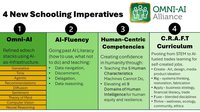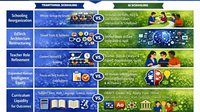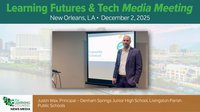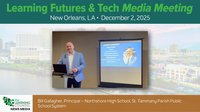When I took office as North Carolina's State Superintendent of Public Instruction in January 2021, our state's literacy landscape resembled many others across the country. Three-cueing—a decades-old approach to early literacy instruction that is not grounded in learning science--was the dominant form of early literacy instruction, leading to a generation of low reading proficiency rates.
The statistics are sobering. Before the pandemic, only 36% of our students were starting 9th grade reading proficiently. Even more alarming, just 14% of African American 8th graders were considered proficient readers heading into high school. As a former high school English teacher, I had seen firsthand how frustrating it was to have two-thirds of my students unable to read grade-level texts. And as a lifelong educator, I knew that improving literacy proficiency rates would be part of my promise to voters as I campaigned in 2020 to become the state superintendent.
Fortunately, I found allies in the legislature, the State Board of Education, and the Governor's office who shared my conviction that we needed a dramatic shift in how we teach reading.
As a result of our work, the Excellent Public Schools Act was passed in 2021, mandating science-based reading instruction and high-quality literacy professional development for all PK-5 teachers and one elementary administrator per building across North Carolina.
Implementing this sweeping change was an immense undertaking. We divided our approximately 44,000 participants into three cohorts with staggered start dates. We started by forming a coalition of the willing to determine who would “go first.” By the summer of 2024, all 44,000 educators had completed the 180-hour literacy professional development.
Communication was critical. We used social media and state board of education meetings to highlight early wins by districts and schools. We celebrated milestones, made videos, and visited high-performing classrooms. We used our assessment data to identify small Title I districts that were showing remarkable progress and lifted them up at every opportunity.
To ensure consistency and continuity across districts, NC DPI hired one early literacy specialist per district, 115 in total. These specialists are tasked with supporting implementation and providing the required professional development to new teachers entering our system, thereby ensuring fidelity to the science of reading.
I won't sugarcoat it— the timing was challenging. We launched this initiative as we were emerging from the pandemic, and we faced pushback from some teachers and superintendents who asked us to pause. Teachers were exhausted and this just felt like “one more thing.” But we held firm, knowing that if not now, then when? If not us, then who? When it came to ensuring that all students could become proficient readers, there was not a moment to waste.
The results speak for themselves. In the 2022-2023 school year, our kindergarteners grew 40 percentage points in reading readiness from the beginning of the year to the end, compared to just 25 percentage points nationally. First grade saw a 19-percentage point jump, second grade an 11-point jump, and third grade a 3-point jump.
Even more encouraging are the gains we're seeing among historically underserved populations. Our Black students have seen a 16-percentage point increase since the beginning of the year, 6% higher than the national average. Our Hispanic population saw a 17% gain, and our American Indian population saw an impressive 21% gain.
In real numbers, over 20,000 fewer students were well below the benchmark than when we started our journey. That means 20,000 students are no longer at risk for needing interventions. Additionally, 34,000 more students are at or above the benchmark compared to when we began.
At the start of the 2024-2025 school year, every student had a teacher who has completed science of reading professional development. Our latest K-3 data show that North Carolina students taught by educators trained in the science of reading consistently outperform national averages across all grade levels and student subgroups. Additionally, each cohort is entering the next grade better prepared for core instruction than the previous year’s.
For instance, 28% of kindergarten students beginning school in 2022-23 were prepared for core instruction. By the start of second grade, that same group has doubled their readiness, with 56% now prepared. This data reflects not only an increase in teacher expertise but also a transformative shift in instructional practices across the state, driving better outcomes for our students.
For states embarking on similar journeys, I offer these lessons learned:
- Ensure bipartisan support. Having everyone rowing in the same direction is crucial for success.
- Focus relentlessly on what's right for kids. Be bold and tune out the noise.
- Leadership matters. Stay committed to your vision, even when faced with pushback.
- Celebrate early wins and share success stories. This helps build momentum and buy-in.
- Choose high-quality professional development and implementation partners. Their support and flexibility are invaluable.
- Use data to drive decisions and showcase progress. Numbers don't lie, and they can be powerful motivators.
- Be patient. Change takes time, but the results are worth it.
The journey we've undertaken in North Carolina is about more than just improving test scores. We are changing the trajectory of students' lives. Reading is fundamental to everything a student hopes to achieve, and by ensuring our children learn to read effectively, we're opening doors of opportunity that might otherwise remain closed.
As educators, we have the power to make a profound difference in the lives of our students. The science of reading isn't just another educational trend. It is a research-backed approach that can help all children become proficient readers. By embracing this science and providing our teachers with the knowledge and tools they need, we're not just teaching reading – we're building futures. Together, we can ensure that every child has the fundamental skill they need to succeed—the ability to read.
About the author
Catherine Truitt is the former North Carolina Superintendent of Public Instruction











